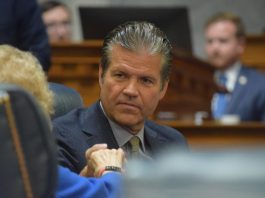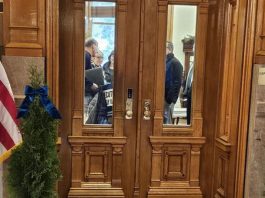“Internationally, up to 28 billion pounds of waste makes it into our oceans every year, harming marine life and coastal economies,â€Â said EPA Administrator Andrew Wheeler. “Marine litter is a top priority for this Administration, and working together with our global partners, we aim to solve the current growing marine litter problem in our shared oceans.â€
“It’s scary to think about how much waste – especially plastic – is polluting our environment. Ocean plastics are destroying ecosystems, killing marine life and littering our beaches,â€Â said Rep. Brian Mast (FL-18). “This is a problem that is only going to get worse until we come together to do something about it. Together with the help of the EPA and other agencies, I’m confident that we can get serious about removing pollution from our environment and preventing it from getting there in the first place. The health of our waterways depends on it.â€
“Through our National Laboratories, our universities, and American industry, this program will develop new technologies to keep plastics from entering the ocean, new methods to deconstruct existing plastic waste and upcycle it, and new plastics specifically designed to be recycled,â€Â said Deputy Secretary of Energy Mark W. Menezes. “While the U.S. is not the world’s driver of the marine plastic problem, we intend to drive the solution.â€
“As the Trump Administration continues to advance the nation’s economic, security, and environmental interests, we must address this significant problem impacting the world’s oceans,â€Â said CEQ Chairman Mary Neumayr. “CEQ looks forward to continuing to work with EPA, NOAA, DOE, and all of the Federal agencies to implement this important Strategy.â€
“We recognize that the U.S. cannot solve this global problem alone,â€Â said EPA Office of International and Tribal Affairs Assistant Administrator Chad McIntosh. “Oceans are our shared resource and when we all work together we can protect this resource from marine litter while growing key economic sectors such as tourism and fishing.â€
“The majority of the plastic pollution that enters the ocean comes from rapidly growing cities in the developing world that lack effective waste-management systems,â€Â said United States Agency for International Development Acting Administrator John Barsa. “As part of President Trump’s vision, the U.S. Agency for International Development is working with local governments, communities, and the private sector in key countries to reduce ocean plastic pollution by strengthening systems to manage solid waste and promoting the ‘3Rs’ (reduce, reuse, recycle).â€
“A clean ocean is the bedrock of the American Blue Economy,” said retired Navy Rear Admiral Tim Gallaudet, Ph.D., assistant secretary of commerce for oceans and atmosphere and deputy NOAA administrator. “NOAA’s Marine Debris Program is a core component of this U.S. Marine Litter Strategy, and we are committed to working with EPA and our partners to address the global issue of marine litter. This work is critical to healthy oceans and the coastal communities and economies that depend upon them.â€
“It’s critical for our coastal habitats and economy to ensure our waters remain litter free,â€Â said EPA Region 4 Administrator Mary Walker. “This initiative reinforces the Trump Administration’s commitment as a global leader in advocating for cleaner oceans.â€
The strategy highlights the federal government’s four pillars for tacking the issue of marine litter: (1) building capacity, (2) incentivizing the global recycling market, (3) promoting research and development, (4) promoting marine litter removal. It also identifies existing U.S. legal authorities and federal programs already underway, such as EPA’s Trash Free Waters program.
THE PROBLEM
Five countries in Asia account for over half of the plastic waste input into the ocean: China, Indonesia, the Philippines, Thailand, and Vietnam. The majority of marine litter comes from land-based sources such as littering and the mismanagement of waste and the most effective way to combat marine litter is to prevent and reduce land-based sources of waste from entering our oceans in the first place. To tackle these issues, the U.S. provides a critical global leadership role in improving waste management and recycling.
SNAPSHOT OF U.S. ACTION
U.S. actions to address sources of marine litter focus on building capacity, incentivizing the global recycling market, promoting research and development, and promoting marine litter removal.
EPA, the U.S. Agency for International Development, and the National Oceanic and Atmospheric Administration (NOAA) are collaborating with the Alliance to End Plastic Waste to implement innovative programs and finance initiatives around the world to provide approaches and tools to countries that are struggling with this problem. This partnership is key to addressing marine litter.
Domestically, through EPA’s Trash Free Waters program, EPA works directly with states, municipalities, and businesses to reduce litter, prevent trash from entering waterways, and capture trash that is already in our waters. We currently have over 50 partnership projects across the country. This year, EPA awarded over $7.8 million to 17 recipients within the Gulf States for innovative projects focused on reducing the amount of litter in our waterways through waste prevention and/or removal. EPA will award an additional $2.1 million through the Great Lakes Restoration Initiative Trash Free Waters Grant Program established under President Trump to address marine litter within the Great Lakes watershed.
President Trump’s FY21 Budget proposes over $7 million for EPA to address marine litter domestically and internationally through a multiple year budget proposal. The same proposal was included in the FY22 President’s Budget. The funding would allow EPA to expand the international Trash Free Waters program to large source countries, which are located in southeast Asia. The funding would also allow the expansion of the domestic trash free waters program allowing for even more domestic place-based projects.
NOAA’s Marine Debris Program has provided over $24 million in funding to local partners for prevention, removal, and research initiatives to address marine debris. Thus far, the program has resulted in the removal of over 22,000 metric tons of marine debris from U.S. waters, engaged with more than 65,000 students on marine debris prevention activities, developed 12 marine debris response guides and 11 regional action plans.
DOE’s Plastic Innovation Challenge is a comprehensive program to accelerate innovations that will dramatically reduce plastic waste in oceans and landfills and will position the U.S. as a global leader in advanced plastics collection and recycling technologies and in the manufacture of new plastics that are recyclable by design. Building from a foundation of prior investment and capabilities, DOE expanded their efforts in degradation, recycling and upcycling of plastics.
USAID’s $48 million flagship, five-year, global program Clean Cities, Blue Ocean works in rapidly urbanizing countries across Asia and Latin America to target marine plastics directly at their source. It works to improve systems that manage solid waste, build capacity and commitment to the “3Rs†(reduce, reuse, recycle) and promote sustainable social and behavior change.



